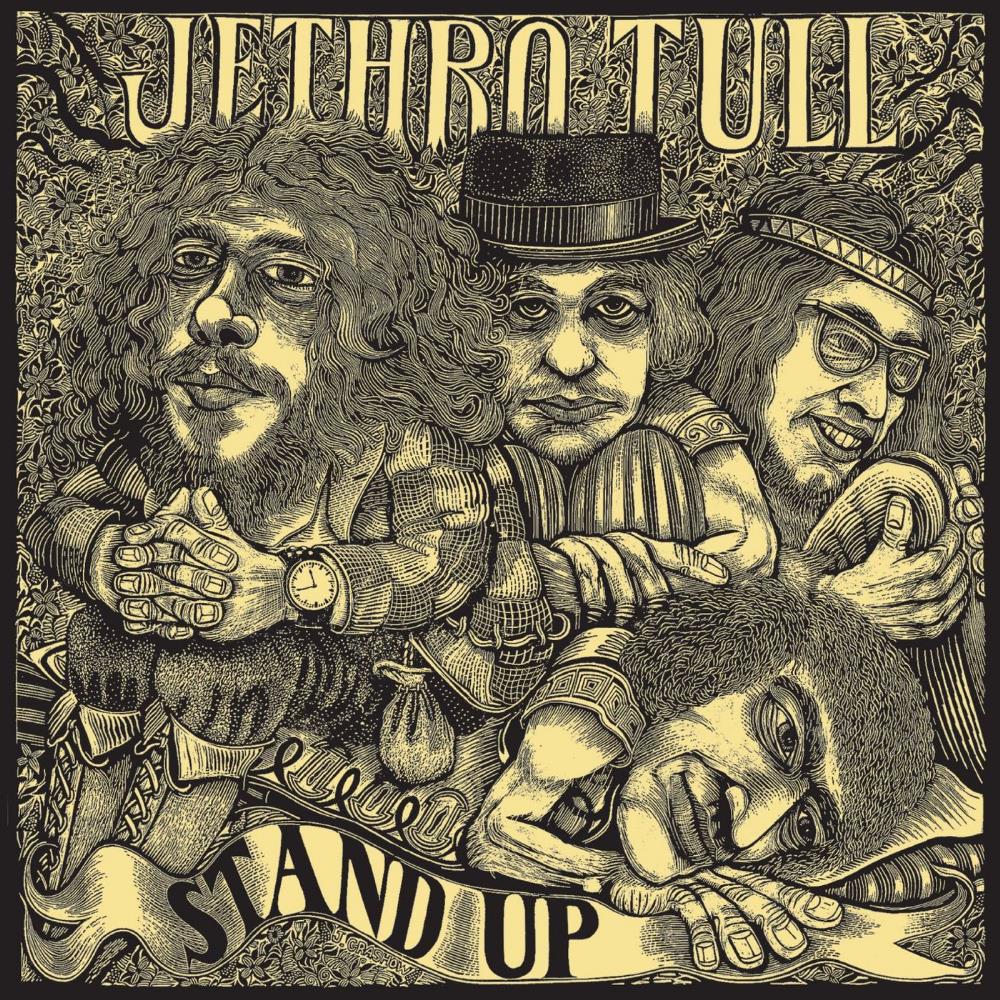For many fans 1969’s Stand Up is where the Jethro Tull’s story really starts. That’s not to say that their debut, This Was, wasn’t any good, but Stand Up is where Jethro Tull started to sound like no one other act than Jethro Tull.
In the few months that split the release of This Was and Stand Up, guitarist and co-band leader Mick Abrahams had been pushed / stood down from his position as co-leader of Jethro Tull (he would emerge mere weeks later with his own band, blues rockers, Blodwyn Pig), allowing wild-eyed flute player Ian Anderson to establish himself as the benign dictator of Jethro Tull. The first order of business under Anderson’s new regime was to recruit a guitar player with a broader range than Abrahams’ bluesy riffage. Tony Iommi of Black Sabbath fame briefly filled in (that’s him in the footage of Tull at the Rolling Stones’ Rock and Roll Circus), but a more permanent replacement was found in one of the least likely guitar heroes that the UK has ever produced. Martin Lancelot Barre was a relatively introverted guy by rock and roll standards who was able to play his guitar in just about any style that the music demanded, so for Anderson’s vision of where Jethro Tull should be heading, he was a perfect fit and Barre remained a faithful and long-serving lieutenant to Anderson for well over four decades.
A guitar-toting introvert in place, Tull set about radically changing their sound for Stand Up. The blues were still present and correct, particularly on tunes like “A New Day Yesterday” and “Nothing is Easy”, but the band also assimilated more progressive elements into their sound, with a small side order of European folk (“Look Into the Sun” and “Reasons for Waiting”), a cheeky nod to Johann Sebastian Bach (the fan-favourite “Bouree”, on which bass player Glen Cornick was given the opportunity to show exactly what he was capable of when the rest of the band piped down and gave him centre stage), all feeding in to a more idiosyncratic approach, with Anderson himself making a huge leap forward as both vocalist and lyricist. From blues rock bluster, to the more gentle and romantic sounds, Anderson’s writing and arrangements had taken a leap forward from those on Tull’s debut and suddenly the scope of the band’s sound was much wider, allowing room for tracks as diverse as the light-hearted mandolinathon of “Fat Man”, and the closing track, “For A Thousand Mothers”, a track which showed that, when the mood took them, Jethro Tull could rock with the best and is a brilliant showcase for drummer Clive Bunker, whose enthusiastic kit-thrashing is a huge feature throughout Stand Up.
In many ways Stand Up is Tull’s most rounded album, with its generous range of styles and moods somehow shaped into a beautifully well-balanced album which showed just how stylistically nimble they could be when compared to their contemporaries. Even at this early stage of Jethro Tull’s career Ian Anderson also understood exactly how to produce the band to best effect, with Stand Up having a wonderfully open and uncluttered sound which gave each instrument space to breathe, and particularly making the most the most of Martin Barre’s gorgeously rounded guitar playing.
For all of Stand Up’s diversity and brilliance, listening back, its impressive that Anderson had enough self control to not include big hits like “Living in the Past” and Sweet Dream” on the album. Then again, this was the back end of an era where including singles that the fans had already bought on an album was considered to be something of a rip-off, so maybe it was a happy accident. Whatever the case, it results in Stand Up being a collection of ten great tunes which demonstrated the band’s range without sounding piecemeal, sequenced in exactly the right order, with nothing surplus to requirements.
As an album, Stand Up finds Jethro Tull at a crucial point in their career, and it temporarily set them up to be critical darlings and chart toppers. It was the apex of a whirlwind few months that would briefly put them on terms with Led Zeppelin, Creedence Clearwater Revival and The Rolling Stones, both in terms of sales and critical success. Of course Jethro Tull would go on to enjoy a lengthy career, with regular changes in direction, line up and fortune, but Stand Up is the album which established them as a band which stood out from the blues rock rank and file, and laid the creative template for Anderson, Barre and their bandmates to enjoy enormous success throughout the 70s and beyond.














No Comment